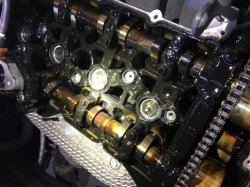
— A Hyundai oil sludge lawsuit alleges Kia and Hyundai vehicles equipped with Theta II engines have fuel injection systems that cause contaminants to invade the engine oil.
Plaintiff Andrea Smolek and her husband purchased a new 2015 Kia Sorento LX with a 2.4L Theta II engine in October 2014 from a dealership in Illinois.
In 2016, the plaintiff was driving the Kia when she heard a series of loud noises from the engine compartment, followed by violent shaking of the Sorento and the illumination of the check engine light. The SUV was towed to a dealership where the technician allegedly found the engine oil had turned to sludge.
Kia asked for the oil change records and Smolek says she provided the records to prove the oil had been changed based on Kia's recommendations. However, a technician then told her he had believed the oil had never been changed.
The warranty claim was submitted to Kia but allegedly denied, causing the plaintiff to complain to the dealership. Smolek was allegedly told the dealer could inspect the engine but would charge $1,000 if no engine defects were found.
In addition, a dealer employee allegedly told her any remaining powertrain warranty would be voided if the plaintiff did not have the engine replaced before leaving the dealership.
Smolek says she felt like she had no choice but to purchase a refurbished engine from the Kia dealer at a price of $6,000, including installation, a task that allegedly caused her to take out two loans to pay for the engine.
According to the lawsuit, the oil sludge occurs because of the Theta II fuel injection systems within the combustion chambers. A Theta II GDI engine sprays fuel directly into the combustion chamber using pressures up to 1,935 psi, but the intake valves do not get sprayed with fuel.
The buildup of oil and other contaminants on the intake valves reduces engine performance and fuel economy, but the buildup eventually dislodges from the valves and falls onto the piston heads in the combustion chamber.
The high pressures needed for combustion allegedly force the dislodged buildup against the engine’s piston and piston rings. As the particulates stick to the piston seal ring, they create microscopic grooves in the cylinder walls and cause gaps for more dislodged buildup to move from the intake valve into the engine’s oil.
This, according to the lawsuit, creates the oil sludge that ruins the engines.
Pumping oil sludge through the engine’s oil ports causes the ports to clog and restricts the flow of oil, leaving the moving parts to rub directly on each other. This metal-on-metal contact creates metal shavings that combine with the oil sludge and causes total engine failure from bearings that seize.
Owners typically report knocking engines, a loss of power and stalling engines, and the lawsuit alleges the only fix for oil sludge problems is a new engine which may cost up to $10,000.
The plaintiff claims Hyundai and Kia have known about the oil sludge problems because dealers were sent technical service bulletins in 2012 regarding Theta II engines that suffered from knocking noises.
But the plaintiff claims rather than accepting responsibility, Hyundai and Kia blamed the problem on the use of aftermarket oil filters commonly used in oil change shops and instructed dealers to replace the oil filter and charge the owner for the filter and labor.
The plaintiff also claims Hyundai and Kia changed the owner's manuals to require the addition of fuel additives to the gas tanks with every oil change, allegedly making the alterations because of knocking engines.
According to the lawsuit, Hyundai and Kia have received thousands of oil sludge complaints yet they constantly deny warranty claims for Theta II engines that have been destroyed.
The lawsuit also references a report about a former Hyundai engineer who told the National Highway Traffic Safety Administration (NHTSA) about alleged oil sludge problems.
Both Hyundai and Kia have ordered recalls for vehicles with 2.0L and 2.4L Theta II engines, including a 2015 recall of 470,000 model year 2011-2012 Sonatas.
Then in April 2017, Kia recalled more than 618,000 Kia Optima and Sorento vehicles, and at the same time Hyundai recalled 572,000 Sonatas and Santa Fe Sports.
In addition, in May 2017, NHTSA opened an investigation to determine if the recalls were good enough to fix the oil sludge problems.
The proposed class-action lawsuit includes all consumers in Illinois who are former or current owners or lessees of vehicles equipped with Theta II engines that were not previously recalled.
The Hyundai and Kia oil sludge lawsuit was filed in the U.S. District Court for the Northern District of Illinois - Smolek, et al., v. Hyundai Motor America, et al.
The plaintiff is represented by Bardo Law, P.C., and Migliaccio & Rathod LLP.




